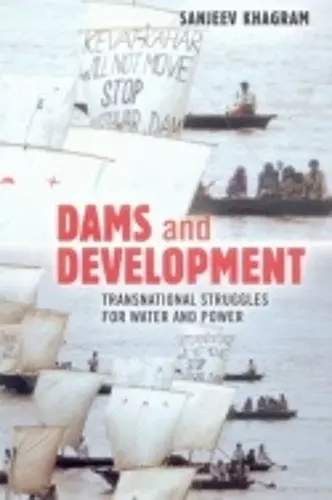Dams and Development
Transnational Struggles for Water and Power
Format:Paperback
Publisher:Cornell University Press
Published:27th Jul '04
Currently unavailable, and unfortunately no date known when it will be back

Big dams built for irrigation, power, water supply, and other purposes were among the most potent symbols of economic development for much of the twentieth century. Of late they have become a lightning rod for challenges to this vision of development as something planned by elites with scant regard for environmental and social consequences—especially for the populations that are displaced as their homelands are flooded. In this book, Sanjeev Khagram traces changes in our ideas of what constitutes appropriate development through the shifting transnational dynamics of big dam construction.
Khagram tells the story of a growing, but contentious, world society that features novel and increasingly efficacious norms of appropriate behavior in such areas as human rights and environmental protection. The transnational coalitions and networks led by nongovernmental groups that espouse such norms may seem weak in comparison with states, corporations, and such international agencies as the World Bank. Yet they became progressively more effective at altering the policies and practices of these historically more powerful actors and organizations from the 1970s on.
Khagram develops these claims in a detailed ethnographic account of the transnational struggles around the Narmada River Valley Dam Projects in central India, a huge complex of thirty large and more than three thousand small dams. He offers further substantiation through a comparative historical analysis of the political economy of big dam projects in India, Brazil, South Africa, and China as well as by examining the changing behavior of international agencies and global companies. The author concludes with a discussion of the World Commission on Dams, an innovative attempt in the late 1990s to generate new norms among conflicting stakeholders.
"Dams and Development could just as accurately be titled 'Dams and Democracy.' In recounting a richly detailed story of the rise and fall of the era of 'big dams' first in the United States and other developed countries and then in the developing world, Sanjeev Khagram tells us a great deal about both domestic democracy and an emerging transnational democracy. Today the effort to build a big dam anywhere in the world will unleash a flood of opposition from social and environmental groups on site and from around the world, groups that can mobilize the tools of democratic advocacy in their own countries and can often become forces for democratization in the country affected. Dams as instruments of democratization? Read on!" -- Anne-Marie Slaughter, Dean, Woodrow Wilson School of Public and International Affairs, Princeton University
"Powerful development agencies, such as the World Bank, multinational corporations, and states once built big dams in the name of development progress. Since the 1980s, this became less and less possible as critics around the world mounted unprecedented challenges to the claim that big dams promote development. Sanjeev Khagram explicates the conditions under which this massive paradigm shift occurred and why the innovative World Commission on Dams emerged. This unique book is essential reading for all scholars and practitioners interested in the political economy of sustainable development." -- Robert Goodland, formerly of The World Bank Environment Program
"Sanjeev Khagram brilliantly navigates the complex histories of mega-project development and never loses the plot: the changeable trajectories of these efforts across the decades and the capacity of the powerless to contest this kind of development. The analysis shows that 'history' can be undone, no matter how powerful those who script it." -- Saskia Sassen, author of Globalization and Its Discontents
"Sanjeev Khagram has written an illuminating account of how a series of world movements have undercut the established world pattern celebrating large dams as a path to progress, and have greatly reduced the numbers of such dams that are built. World mobilizations around the human rights of displaced people, and then the environment, and then the rights of indigenous peoples have supported surprising levels of power for the formerly powerless, particularly under democratic conditions that facilitate local mobilization. The book will be of great interest to those concerned with the world environmental movement, but also to political scientists and sociologists attentive to the new supra-national structures of the modern world polity. For all these scholars, this book provides a most dramatic and convincing case, emphasizing India but with much comparative material." -- John W. Meyer, Professor Emeritus, Stanford University
"The sustained advocacy of the anti-dam network, an affiliation of conservationists, environmentalists, and other civil society groups, was directly responsible for the formation of the World Commission on Dams (WCD), which published a report assessing the social impacts of dams. It found in many instances that these dams had an overwhelmingly negative effect that was rarely 'adequately addressed or accounted for' and were directly responsible for a range of human rights violations including: forced displacement without compensation of between 40-80 million people around the world, loss of livelihood, loss of cultural heritage, loss of development capacity, and so on. A new book, Dams and Development: Transnational Struggles for Water and Power, by Sanjeev Khagram, tells the detailed story." -- Mary Robinson, former president of Ireland and U.N. high commissioner for human rights, and currently the executive director of Realizing Rights: The Ethical Globalization Initiative, in a speech to the American Sociological Association, August 2004
ISBN: 9780801489075
Dimensions: 229mm x 152mm x 21mm
Weight: 454g
288 pages